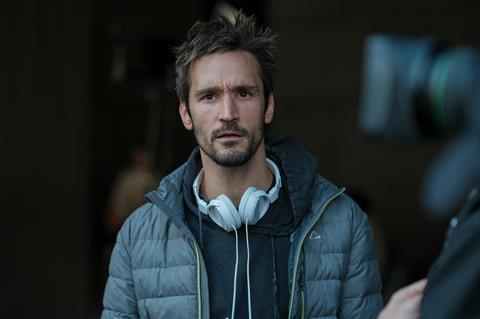
Montreal-based filmmaker Pascal Plante’s Red Rooms is making its world premieres this week in Karlovy Vary’s Crystal Globe competition. It will then have its North American premiere on July 20 as the opening film of the Fantasia Film Festival.
Described as an ‘anti serial-killer movie’, Red Rooms follows Kelly-Anne, played by Juliette Gariépy, who religiously attends every day of the trial of accused serial killer Ludovic Chevalier (Maxwell McCabe-Lokos). It soon becomes clear that her obsession with Chevalier is linked to her loner lifestyle and – as she spends more time in the courtroom with the family of the victims – the walls of reality begin to break down around her.
The film is produced by Montreal’s Nemesis Films. Sales are handled by the new international sales arm of Quebec-based distributor H264 after original sales agent Sphere wound up operations.
Plante made his feature debut with punk romance Fake Tattoos which screened at the Berlinale in 2018 in the Generation 14plus section. His sophomore effort, the sports movie Nadia, Butterfly played in Official Selection for the 2020 edition of Cannes.
You have described Red Rooms as being motivated by pandemic angst?
Like most people, I’d been experiencing depressive episodes throughout 2020-21. At the time I’d just finished my previous feature – Nadia, Butterfly – but I couldn’t share it with anyone for many months due to the pandemic. As sheer escapism, I’d started binge-watching films to the point where I started being a bit desensitised to some of the content. I’ve been aware of the phenomenon of “serial killer groupies” for a while now. My producer Dominique Dussault and I had a hunch that this could be an interesting angle for a story, but it only came together once I integrated the “cyber-criminality” aspect of it.

You also describe the film as an ‘anti serial killer’ film. Were you a fan of the genre before you made the film?
I’m a cinephile with eclectic tastes. I like a good thriller/horror film once in a while, but I don’t necessarily crave for them. When I do, I gravitate towards Michael Haneke way more than, say, Eli Roth. During Covid, however, I found myself drawn more and more towards more exploitative genre films, as well as “true crime” documentaries. After watching hours of content featuring the likes of Ted Bundy, I would always feel drained. That voyeurism felt like vampirism. It confirmed what my producer and I had suspected: that there’s mostly two sides of these crime stories being told: either the killer’s side or the police’s side…but never the spectator’s side. This felt like a fresh vantage point to tackle the genre.
What kind of approach have you taken with the film?
The film starts really “cold” – with realism in mind – but spirals more and more into fantasy territory. Kelly-Anne is a real geek: She’s into medieval art, cosplay, hacking… she’s most probably into horror films as well. It felt right to be more visually and sonically expressionistic as the film develops and as Kelly-Anne’s state of mind becomes more unstable.
The film still leaves room for a sliver of hope though?
I hope so! Even if the film is quite dark, it is not sadistic in the least. I have no idea if the film will be shocking to some viewers but my goal was never to shock but rather to raise questions and spark discussion.
How was it getting the funding together for the film?
In Québec, we are able to tap into strong provincial funding (through Sodec) as well as federal funding (through Telefilm Canada). The momentum generated by Nadia, Butterfly’s Cannes official selection must have helped: we got greenlit on our first application, which is pretty rare. Even if I was proud of the screenplay for Red Rooms, there was still no guarantee that governmental institutions would go for it, since there’s usually a blind spot for genre-oriented projects, even if this is slowly changing these days.
The film’s original sales agent, Sphere Films International, ceased trading a few weeks ago, leaving you without a sales agent for the film. How has that affected things?
Anick Poirier and Lorne Price from Sphere Films International were the ones who’d initially kickstarted the international path of Red Rooms; they’ve been accompanying us since the very beginning and they’ve been with us through the ups and downs of our previous feature as well. So it was a bit emotional to see them go. But my producer Dominique Dussault has been working overtime. The Quebec-based distributor and aggregator H264 has just launched an international sales division, and they will be taking care of our film. It’s been thrilling to see H264 grow and evolve over the years, and we feel in very good hands with Jean-Christophe J. Lamontagne and his team as we head towards our world premiere.
What projects will you be working on next?
There’s actually a screenplay, co-written with Dominique Dussault, that is almost complete. It’s a period film that takes place mostly on a boat between France and Québec. A female-led folk-horror survival tale. It seems like the pandemic made me more of a genre filmmaker than I originally was!

























No comments yet